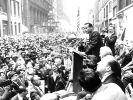Eye For Film >> Movies >> Sing Your Song (2011) Film Review
Hot on the heels of Kevin Macdonald’s Marley comes another documentary about an artist who used his fame to highlight injustice and promote a message of equality – Harry Belafonte.
He’s perhaps best-known in Britain for The Banana Boat Song (the ‘Day-O’ one, itself perhaps best known through the ‘too loud, man’ spoof version) and as an actor in films as diverse as Carmen Jones and The World, The Flesh And The Devil. But he’s also been involved in just about every good cause and political hot potato that’s emerged in his 50-year career, most notably the Civil Rights Movement.

As he opens the film revisiting his Harlem birthplace and recounts his early years, the similarities between his life and Marley’s are fascinating. Belafonte’s mother was Jamaican and he spent much of his youth on the island. Both men had to deal with an absent father and an upbringing of grinding poverty, which greatly affected their character and political outlook.
Belafonte’s initial break came through acting rather than music – while working as a janitor he received a ticket to an American Negro Theater production as payment in kind and immediately decided this was the life for him. Handsome, charismatic and articulate, he’d soon carved out a successful career on stage and screen and discovered a talent for singing which led to jazz gigs with the likes of Charlie Parker in his backing band.
He was the first artist to have a million-selling record and astutely got into TV at just the right moment. But he used his fame to promote the folk music of Jamaica rather than the hipper and more popular jazz. And his early experiences of naked racism as he toured the USA led to a vocal and unswerving support for the work of Martin Luther King in promoting the cause of racial equality.
The archive footage and Belafonte’s own personal reminiscences are still jaw-dropping evidence of the institutionalised injustice that existed in American society barely 50 years ago and the abuse, threats and outright violence which even its most famous stars could expect if they questioned the status quo. As he becomes more and more involved, helping to organise the March on Washington in 1963 and encountering the Ku Klux Klan first-hand during a voter registration campaign in Mississippi, it’s impossible not to admire his courage and commitment.
But the main difference between this film and Macdonald’s is also its chief weakness; everything is told through Belafonte’s own words, often in direct to camera monologue. Marley was an officially-sanctioned version of its subject’s life, with family input on the production side, too, but the result – whether because of the protagonist’s tragic absence or a little more directorial rigour – was a more rounded, even-handed film.
Belafonte acknowledges that the pressures of his work (artistic and political) led to the break-up of two marriages and problems with being a good father. But more details, as well as any sense of his early life and what really motivated him to devote so much time and energy to activism, are missing.
As he tells you (or one of his high-profile friends such as Sidney Poitier or Archbishop Tutu tell you on his behalf) how important his work was to the movement and how much interference and prejudice he had to overcome from the CIA, the FBI and the television networks it’s hard to suppress a nagging, guilty feeling that there’s a fairly large showbiz star ego nestling alongside the righteous idealism in his character.
Of course, in an era when many people’s only protest work is to sign an online petition it’s easy to knock someone who’s faced career derailments, death threats and arrest for their beliefs as just another attention-seeking celeb. It’s always worth remembering that Belafonte could easily have played it safe and counted his money as soon as he became famous.
Instead he ploughed his undoubted charisma and fierce energy into a never-ending array of projects – from organising the We Are The World recording in aid of Ethiopian famine relief to campaigning against political corruption in Hawaii and instigating projects to tackle gang culture in LA, often putting himself on a collision course with the US government. The stories of the FBI’s cack-handed attempts to smear him as a Communist offer some black comedy in a somewhat earnest hour and three-quarters but also highlight how intolerant the ‘land of the free’ can become when someone doesn’t take the official version of its actions at face value, no matter how famous they are.
I had no idea he’d been involved in half the causes he documents, unlike some of today’s ‘look at me’ celebrity activists. But even here there’s a sense that Belafonte doesn’t believe any issue has been adequately addressed until he turns his attention to it.
Rostock marshals the fascinating archive footage adroitly enough and the TV clips (though not entirely cheese- or saccharine-free) remind you what a huge and ground-breaking star he was in the medium. But removing the man himself from centre stage a little would have worked wonders.
In the end, the viewer comes away with a definite sense of a life with far more on the credit than the debit side of the ledger, but with the equally strong feeling that a more neutral, independent documentary would have reached the same conclusion with a little less self-aggrandising.
Reviewed on: 06 Jun 2012
















